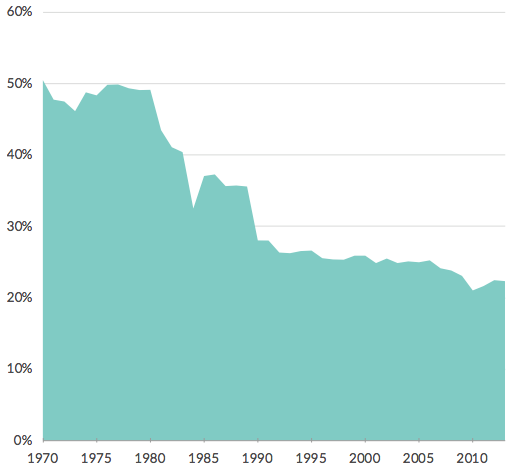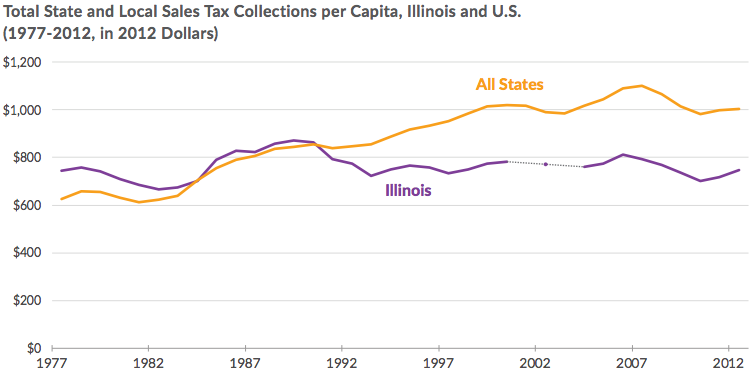Illinois basically runs on what are called the "big three" taxes—income, sales, and corporate. Combined, they pull in about 75 percent of the state's general funds revenue. But the three aren't created alike. Income taxes are the biggest, expected to generate over $15 billion in fiscal year 2017, about half of all state sources. Corporate taxes are projected to bring in around $2.7 billion. Both of those are substantially lower now that a temporary tax hike was allowed to sunset.
In between are sales taxes, which are projected to bring in around $8.2 billion. Unlike the income and corporate tax rates, they remained the same. Unfortunately, they're struggling on their own. In the most recent state economic forecast, the authors write (emphasis mine): "Corporate income taxes have underperformed so far in FY'16. Given the poor outlook for corporate profits over the forecast horizon the net estimate has been lowered by $73 million. Sales taxes have struggled to produce any growth thus far in FY'16. Lower fuel prices are a contributing factor to the suppressed outlook as is a moderating outlook on overall consumer appetite. As a result, the lack of sales tax growth experienced thus far equates to a downward revision of $230 million."
Illinois sales tax growth has averaged 3.4 percent over the past five years, lowest of the big three taxes. I decided to check up on them because of something Rich Miller wrote recently about the state's growing deficit:
Comptroller Leslie Munger, who pays the state's bills, told reporters last week that come late December the state will still be paying off invoices from June and it'll have a total bill payment backlog of $10 billion.
The very same day, the respected and bipartisan Commission on Government Forecasting and Accountability projected the stopgap deal has an $8 billion deficit.
The sunsetting of the state's income and corporate tax increases gets a lot of the blame for that, as I've reported. CGFA estimated recently that, had a one-percent income tax increase been put in place by July 1, the state would have had $3.6 billion for FY17 and $4.1 billion for FY18.
But the sales tax doesn't get as much attention, even as its ability to support the state weakens. To get a sense of that, last year's "Illinois Illustrated" report from the Tax Foundation and the Taxpayers' Federation of Illinois has a couple clever visualizations (first reported by Caitlin Wilson at Reboot Illinois). First is the state's "sales tax breadth," "the ratio of the implicit sales tax base to state personal income."

As services take up an increasing amount of the economy and consumer spending, this decline isn't uncommon, but Illinois has one of the narrowest sales-tax bases in the country. In 2012, Illinois had $36 billion in total tax revenue, comparable to Florida at $33 billion, but Illinois's sales tax revenues were less than half of Florida's. Illinois had over $20 billion more in tax revenues than Indiana, but only two billion more in sales-tax revenue compared to its much smaller neighbor.
And that's been the trend for the past two decades.

Illinois has a high sales tax rate, but because its base is so narrow, it actually has fairly low sales tax revenues. The average state, as of 2012, got 23 percent of its taxes from sales; Illinois, just 15 percent. This goes some way toward explaining why Illinois is more dependent on property taxes than other states (38 percent of revenues versus 32 percent for the average state).
For the most part, Bruce Rauner has left tax increases as something he'd allow the Democrats to do in exchange for passing his agenda—generously trading them the ability to do something politically unpopular if they do something unpopular for their base. But broadening the sales tax base is one thing the fiscally conservative businessman has gotten behind:
Using charts and graphs, Rauner explained how surrounding states use broader-based sales taxes than Illinois to take advantage of growing service economies. "We're not competitive," Rauner said.
The idea of expanding the state's sales tax base to include services, such as on auto repairs, dog grooming or haircuts, has been debated in Illinois since the late 1980s. Expansion efforts repeatedly have stalled in the face of heavy resistance, but Rauner outlined how he thinks Illinois is "out of balance" with other states.
"We are not thoughtful about this," Rauner said, adding that the Illinois sales tax is too high and too narrowly applied.
That was January 2015. Since then, the state's sales tax revenues have greatly underwhelmed forecasters. As the state totters on with a Band-Aid of a budget, it may have to consider new revenues that even Bruce Rauner likes.



